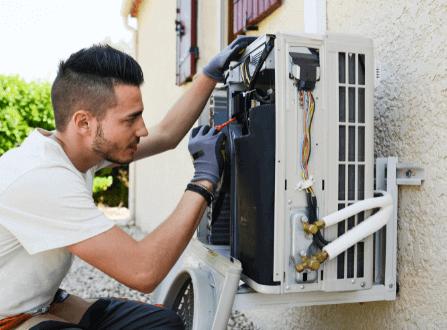Recognition of Prior Learning, often referred to as RPL, is one of the most practical ways for skilled workers to have their existing experience converted into nationally recognised qualifications. For professionals in technical and trade industries, this process saves valuable time and ensures their hard work is formally acknowledged. Qualifications in refrigeration, air conditioning, mechanical trades, fabrication, carpentry, heavy mechanics, and building sectors are all attainable through RPL assessments.
Certificate iii in air conditioning and refrigeration rpl
The Certificate iii in air conditioning and refrigeration rpl is designed for individuals who have worked with cooling systems and want their expertise validated. Whether you have years of field experience installing, servicing, or repairing systems, this pathway helps you achieve a recognised credential. Many professionals opt for the cert 3 air con rpl because it allows them to move into higher roles, meet licensing requirements, or demonstrate compliance with industry standards. Similarly, the certificate iii in air con rpl serves as a foundation qualification for those aiming to specialise further in the refrigeration and air conditioning sector.
Air con rpl is not just about theory—it focuses on ensuring that your practical skills are recognised. Those who have spent time managing system efficiency, refrigerant handling, and compliance checks will find this assessment highly beneficial. In addition, professionals with overlapping knowledge often pursue hvac rpl to consolidate both heating and Skills certified engineering into one comprehensive recognition pathway. Refrigeration rpl is also a key part of this qualification, covering expertise in cold storage and industrial systems. For many, uee32220 rpl is the official code linked with this qualification, confirming their readiness for licensed work.
Carpentry rpl and cert 3 carpentry rpl
For those in construction and building trades, carpentry rpl provides a direct pathway to recognition. Professionals who have been working in residential or commercial carpentry but lack formal training can validate their skills. The cert 3 carpentry rpl is a highly sought-after qualification, as it serves as an entry point to building licensing requirements in many parts of Australia.
This pathway acknowledges skills such as framework construction, interior and exterior finishing, and the ability to interpret building plans. Those who complete the assessment not only enhance their career opportunities but also build trust with clients and employers who value certified expertise.
Fabrication rpl and mechanical trade rpl
Fabrication rpl is suited for individuals working with steel, sheet metal, or welding processes. Many professionals in manufacturing industries gain valuable hands-on experience but never obtain formal certification. With RPL, their abilities in creating, assembling, and repairing metal structures are formally recognised.
Similarly, mechanical trade rpl focuses on individuals who work in maintenance and repair of mechanical systems. Whether it’s plant machinery, engines, or industrial systems, this recognition pathway ensures that years of service in mechanical trades are not overlooked.
The certificate iii in engineering mechanical rpl supports workers with practical expertise in machining, fitting, and assembly. By undertaking this assessment, they demonstrate not just competency but also adherence to industry standards. For those specialising in fabrication, the certificate iii in engineering fabrication rpl provides formal recognition of welding, structural steelwork, and manufacturing capabilities.
Certificate 3 engineering rpl and skills certified engineering
Workers with multi-disciplinary engineering experience often pursue certificate 3 engineering rpl. This recognition offers flexibility for those whose work spans both mechanical and fabrication tasks. It ensures that all engineering expertise, from machine operation to structural design, is acknowledged.
Skills certified engineering programs are particularly valuable in industries where safety and precision are crucial. Recognised qualifications provide confidence to employers and clients while opening doors to new contracts and professional growth.
Heavy mechanic rpl and diesel fitter rpl
Heavy mechanics and diesel fitters are vital in industries such as transport, mining, and construction. Heavy mechanic rpl ensures that technicians working on trucks, earthmoving equipment, and industrial engines receive the recognition they deserve. Similarly, diesel fitter rpl validates the skills of professionals who maintain, repair, and rebuild diesel-powered systems.
These qualifications not only boost employability but also provide pathways into supervisory and specialised technical roles. With industry regulations becoming stricter, having a recognised qualification ensures compliance and demonstrates reliability in the workplace.
Mobile plant rpl and cert 3 mobile plant rpl
Mobile plant operations form the backbone of construction and mining industries. The mobile plant rpl process validates experience in operating bulldozers, excavators, loaders, and other heavy equipment. For professionals who have gained years of expertise without formal training, this recognition is essential.
The cert 3 mobile plant rpl further supports those aiming to secure supervisory positions or expand into specialised machinery operations. This qualification not only boosts career prospects but also ensures alignment with industry safety and compliance standards.
Certificate iv in building rpl
The certificate iv in building rpl is tailored for professionals seeking leadership and management roles in construction. Whether you are already a site supervisor, project manager, or aspiring builder, this recognition consolidates your experience into a nationally recognised qualification.
This certification covers project planning, contract management, and compliance with building codes. Many professionals combine carpentry rpl with certificate iv in building rpl to broaden their career opportunities and meet licensing requirements in the construction industry.
The benefits of RPL across industries
One of the greatest advantages of RPL is that it saves time and cost compared to traditional study. Instead of repeating what you already know, the focus is on providing evidence of existing skills and knowledge. This process also allows experienced workers to meet industry licensing requirements quickly.
For air conditioning, refrigeration, and hvac professionals, RPL ensures compliance with national safety standards. For carpenters and builders, it provides a pathway to licensing. For engineers, mechanical tradespeople, and fabrication specialists, it formalises their role in industries where certification is critical. For heavy mechanics, diesel fitters, and mobile plant operators, it ensures their technical expertise is recognised in industries that demand certified workers.
Building a career with recognised qualifications
By pursuing pathways such as certificate iii in air conditioning and refrigeration rpl, carpentry rpl, fabrication rpl, certificate 3 engineering rpl, or certificate iv in building rpl, individuals set themselves apart in competitive industries. Recognition of skills through RPL is not only about personal growth but also about ensuring long-term career security in industries that are constantly evolving.
Whether you specialise in refrigeration systems, carpentry, fabrication, engineering, or heavy machinery, RPL provides a clear route to certification. It transforms practical experience into professional recognition and positions you for career advancement in Australia’s demanding trade and technical sectors.
Congrats! You’ve Finished This Blog.








